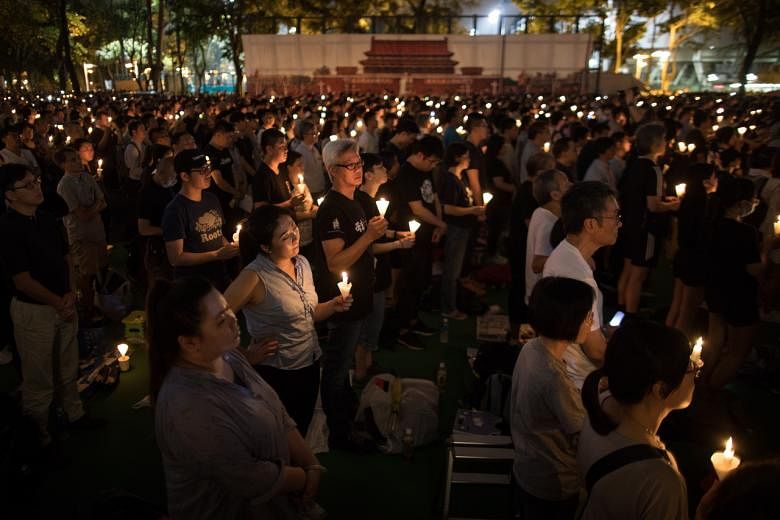HONG KONG - Unlike the recent past, the anniversary of the Tiananmen Square crackdown on Friday (June 4) will pass mostly uneventfully in Hong Kong.
There will be no assemblies, no marching and no chanting of slogans for democratic reforms, although there have been online calls for gatherings.
Up to 7,000 police officers have been mobilised to deal with any contingency.
Some Hong Kongers have come up with creative ways to mark the day. They could be wearing T-shirts emblazoned with a black rectangle of 6:4 ratio, posting "lit" candles on social media, or attending church services to pray for those who died in the 1989 crackdown.
Lee Cheuk-yan, a now jailed democracy activist, wrote in a message published on his Facebook page on Thursday: "A regime can ban an assembly but it can never ban the indelible grievances in people's hearts."
"I hope everyone can find your own way to light a candle by the window, on the road, wherever that can be seen by others, to continue our mourning," he added.
Many Hong Kong democracy figures who have chosen to self-exile plan to lead their own commemorations overseas.
Vigils are planned in cities like Tokyo, Sydney, Taipei, London, Berlin and Washington.
"I hope everyone can all pass on the history and truth of the June 4 massacre and the democratic movement in 1989 to the next generation by safe means," Mr Nathan Law, a former student leader who fled to Britain last year, wrote on Facebook.
Friday's muted affair in Hong Kong will be a marked departure from just two years ago, when tens of thousands, young and old, stood side by side in the sweltering summer heat to commemorate the day.
People would converge on Victoria Park in Causeway Bay - the city's traditional venue for protests and assemblies. At night, the park would turn into a sea of flickering yellow from the hand-held candles of those gathered.
This year, there will be no candlelight vigil in Victoria Park, which usually features parents with children in tow streaming to the exhibition at the June 4th Museum. And there will be no slogans calling for the end of one-party communist rule on the mainland that were often heard at activities marking the day.
The police, citing public health safety, a week ago rejected an application by the Hong Kong Alliance in Support of Patriotic Democratic Movements of China to mark the occasion. This is the second year running that police have refused to grant a permit for the vigil.
The alliance, which is behind the annual June 4 vigil, also runs the June 4th Museum in Mong Kok, which on Wednesday was ordered to shut temporarily. Officials said the operator did not have the required licence to run a place of public entertainment.
For 30 years, Hong Kong and Macau were the only places under Chinese jurisdiction that allowed people to mark the June 4 incident. Participants in Hong Kong would openly denounce the government in Beijing, demand reform, make speeches and sing songs to mark the Tiananmen crackdown by the People's Liberation Army in 1989.
Like in Hong Kong, the Macau authorities have also refused to allow commemorative events this year.
The situation is perhaps more sensitive this year as the 100th anniversary of the Chinese Communist Party falls on July 1.
Hong Kong officials have skirted around the question of whether the chanting of slogans calling for the end of one-party rule breaches the national security law implemented on June 30 last year.
Under the law, secession, subversion, terrorism and collusion with foreign powers are criminalised, drawing heavy penalties of at least 10 years' imprisonment.
Officials effectively left it up to the individual to interpret the law and whether commemoration acts and events meant breaches.

Under the law, Beijing has final say over the interpretation.
The future is uncertain but Mr Richard Tsoi from the Hong Kong Alliance remains optimistic.
He said: "This is an ongoing struggle, an ongoing movement in Hong Kong, not just in the future.
"For the past 30 years, we faced, from time to time, some challenges. It's never easy to predict what will happen in the future. The only way is to continue to uphold our aspirations and beliefs and take each step in a reasonable and careful manner."



